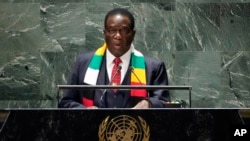Columbus Mavhunga
Some Zimbabweans living in abject poverty are reacting angrily to claims by President Emmerson Mnangagwa that the country’s economy is the fastest growing in the southern African region.
Economists and members of the main opposition say the president is being misinformed or does not understand basic economics.
At the just-ended United Nations General Assembly, Zimbabwean President Emmerson Mnangagwa said his country's economy was the fastest-growing in southern Africa.
“We are recording unprecedented development and economic milestones. For the last three years, our country has been the fastest in our southern African region. Further, Zimbabwe is prioritizing the eradication of poverty and improving the quality of life of our people.”
But in Harare, Laiton Chamani depends on part-time gardening to make a living. The unemployed 37-year-old says the past three years have been difficult for him.
"I make so little money that I'm failing to send my children to school. I need money for school fees, for my wife and for other obligations. I hope I get sponsorship so I can start music and uplift lives of other Zimbabweans.”
Former Finance Minister Tendai Biti, a leader of the main opposition party, disagrees with President Mnangagwa's assessment of the economy. He says the president is “seriously ill-formed and misinformed” as “79% of the population is living in extreme poverty.”
“Over a third have to rely on food assistance from the WFP [World Food Program] and other U.N. agencies. More than 90% of the population is informal employment. Everywhere you go there is decay, decay infrastructure, decay in the mindset. So there is a lot of propaganda, there is a lot of misinformation. This is a limping economy.”
Prosper Chitambara is a senior economist with the Labor and Economic Development Research Institute of Zimbabwe. He says Zimbabwe’s economy took a nosedive in 2019 and 2020 due to Cyclone Idai and drought. He is also concerned about the effect of inflation on citizens, as well as poverty levels.
“Our currency has been affected by inflation. We have seen a depreciation of the currency. So the value, obviously, has been decimated by inflation.”
Chitambara adds that Zimbabwe needs to increase production and stabilize its currency so it can think of sustained growth and reaching an upper middle-income economy, which President Mnangagwa wants to achieve by 2030.





Forum